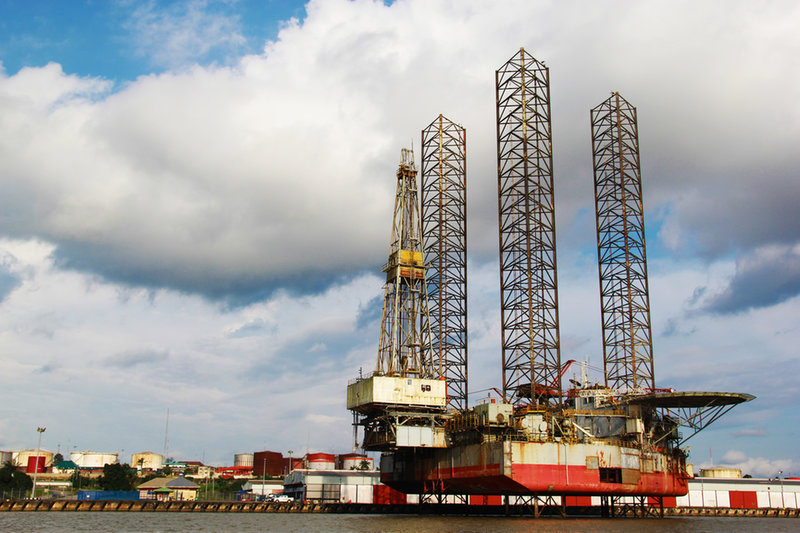
Regional Focus
Shaky shores ahead: can a new oilfield bidding round rebound Nigerian oil?
The Nigerian Government is counting on a new marginal bid round, the first in over two decades, to boost national revenue and reinvigorate the country’s ailing extractives sector. Demand for licences has been high, but will it be enough? Heidi Vella takes a look.
I
n a bid to bolster the country’s declining oil reserves and meet its high production targets, the Nigerian Department of Petroleum Resources (DPR) launched a new marginal field licensing round in June.
The bid covers swamp and shallow-water fields, many of which were previously held by Shell, ExxonMobil, Chevron, and Total. Analysts at Wood Mackenzie estimate that the total resources on offer are around 800 million barrels of oil and 4.5 trillion cubic feet of gas. The 25 largest oilfields supposedly have the potential to unlock $9.4bn of investment over the first five years, generating more than $38bn in revenue over their lifetime.
The round, which has just finished the prequalifying and financial bid stage, is open to domestic companies. Despite the pandemic-induced oil price crash, the round has seen over 600 applications, with around 200 selected for prequalification. This already makes it more successful than a previous one in 2013–2014, which the government failed to implement.
Why now?
Siva Prasad, senior analyst at Rystad Energy, says that the licencing round is designed to counteract the decline of Nigeria’s mature oil sector and help the government meet its production targets.
“The timing of the announcement of this marginal bid round is an attempt to bolster the country’s declining oil reserves, as well as boost revenues battered by the slump in crude price,” he says.
The government, which relies heavily on oil for revenue, had previously set hefty targets of achieving oil reserves of 40 billion barrels and three million barrels of crude oil production per day by 2023.
The Covid-19 pandemic and [subsequent] crude price crash have wreaked further havoc to already deteriorating conditions
Raj Kulasingh, senior counsel, and Kenny Paton, a senior oil and gas lawyer, of legal firm Dentons, say that the new round is also driven by the upcoming election and by a wider fear spreading across all oil producing countries around ‘stranded’ assets. Both scenarios have added a ‘degree of urgency to the bid’.
“Overall, in Africa, due to the fear that oil may end up being stranded because the world will have moved on from oil and they’ll have missed an opportunity to exploit the black gold under their ground, I think you'll start to see a push to try and speed processes up that have historically moved slowly. Nigeria is no different,” explains Paton.
The industry is increasingly feeling the squeeze. This is largely due to low oil prices, global economic uncertainty, a fracturing of OPEC caused by Russia and Saudi Arabia, growing security threats, a revision of royalty payments that has seen deepwater projects delayed, and increasing competition for oil from renewable energy.
“The Covid-19 pandemic and [subsequent] crude price crash have wreaked further havoc to already deteriorating conditions,” adds Prasad.
Viability of current reserves
However, marginal fields, which the DPR defines as a discovered resource left unattended for more than 10 years, are usually considered less financially risky due to being somewhat de-risked.
Osamede Okhomina, CEO of ADM Energy plc, which has prequalified for the bid with local partner OilBank, says that the round is attractive because acquisition costs are not expected to be high.
“The government usually licences them [marginal fields] out cheaply to get development capital to increase production; plus, with marginal licences there is very little geological risk,” he says. Okhomina adds that he is not overly concerned about the low oil price because when the price falls, services contracts are renegotiated, and so operational costs fall in line. Foreign-owned companies, such as ADM, can hold up to 49% of a licence.
The government usually licences marginal fields out cheaply to get development capital to increase production
“Oil price reductions do impact the economics, but they don’t fundamentally change the profitability of the business,” he says. If the bid is successful, he hopes to be producing first oil within 18 months.
Conversely, cost intensive deepwater projects, which require a breakeven oil price of over $60 per barrel but could reverse the nation’s declining production trend, are less viable in the current market. The DPR has said that there are 13 billion barrels of crude oil in Nigeria's deepwater terrain.
“The recent royalty revisions and crude price crash have led to the status of these upcoming projects going from bad to worse,” says Prasad. “These were already delayed but majors operating on these projects have taken them off the near-term development timeline for now.”

A drilling rig in Calabar, Nigeria. Credit: Teo-Inspiro International/Shutterstock
Understanding risk in the Nigerian oil industry
Overall, mature oil producing countries such as Nigeria represent a lower risk for investors compared to entering a new frontier, thanks to existing infrastructure. Nevertheless, Paton says that a lot of international oil companies (IOCs) are leaving, or have left, the region due to many risks yet remaining.
These include government and public discord, as is evident with the ongoing protests against the police and past incidents of damage to key infrastructure in the Niger Delta, risks that further damage the appetite for investment in the Nigerian oil and gas sector. Though these types of issues arise less with offshore assets, there are well documented dangers related to oil and gas contracts and licences.
The federal government proceeded with the round without any indication that the oil-bearing communities would benefit
For the new marginal round, Prasad says that the main challenge lies in overcoming any obstacles from the local Niger Delta communities, and ‘operating in harmony with them and avoiding any further conflict.’
As reported in THISDAY, Niger Delta stakeholders have raised concerns over a potential breach of former President Umaru Yar'Adua's commitment to grant oil-bearing communities a 10% stake in the allocation of blocks. They say that the federal government proceeded with the round without any indication that the oil-bearing communities would benefit. They warned of dire consequences if the commitment is breached.
Nigerian Oil Reform Bill
After almost twenty years, the Petroleum Industry Bill (PIB) passed its first reading in the Nigerian legislature on 30 September. The bill proposes new upstream fiscal terms; an entirely new governance structure for upstream, midstream, and downstream; and a new, commercially-run Nigerian National Petroleum Corporation (NNPC), the national oil company.
Although clearly designed to entice foreign investment, the PIB is likely to disappoint, says Alexandre Raymakers, senior Africa analyst, risk insight, for Verisk Maplecroft, in an insight paper.
“The bill, in its current form, retains significant issues, ranging from the overall clarity of the fiscal regime to the future efficiency of the proposed new regulatory framework. The overall fiscal framework and regulations remain mired in uncertainty, and what is certain is that, at each stage, the bill’s terms on royalty rates will be adjusted,” he says.
Prasad says that the bill has “neither improved the attractiveness nor presented any challenges to the marginal fields.” Meanwhile, Okhomina says that it should bring more “professionalism” into the management process.
For NNPC, lack of capital has always been an issue
“It should make the sector more dynamic and professionally run, streamlining processes,” he adds.
Kulasingh says that from conversations he’s had, there is the feeling that the bill will pass and, in particular, there is a positivity around the privatisation of NNPC.
“For NNPC, lack of capital has always been an issue, with IOCs partnering with the company often having to fund its share of the development costs. But the view is now that if NNPC is corporatised and better structured, better capitalised, with more transparency, that can have a trickle-down effect in the Nigerian economy, with more things getting done,” he explains.
Recently, NNPC repaid significant amounts to reduce the monies owed to some major oil companies, which is a “signal it is looking to get its house in order", adds Paton.
The future
The process of this latest bid round has now reached the end of technical and financial bids submission. Further steps include evaluation, after which the winners will be announced. The process is, so far, on course to be a success. It is worth noting, however, that in the previous marginal bid round in 2003, of the 27 marginal fields awarded, only nine were producing by 2014.
Presently, like any other oil-producing country, the Nigerian oil sector faces many more challenges than it did back then.
“I think the question is, how long these challenges will last? And whether it's just a temporary blip,” says Kulasingh. “Personally, I don't see these problems getting fixed in the near to medium term.”
A privatized NNPC could boost foreign direct investment and improve efficiency
He adds that, in fact, underinvestment in developing oil and gas fields in the region could actually see demand overtake supply, but that would take a “good few years”.
Prasad says there is the possibility that the Covid-19 pandemic and its impact on the oil industry has made reform of the sector urgent and could even be “the catalyst needed to finally push it through”.
“A privatized NNPC could boost foreign direct investment and improve efficiency, potentially leading to new discoveries that could provide a rebound in Nigeria’s oil production curve,” he concludes.